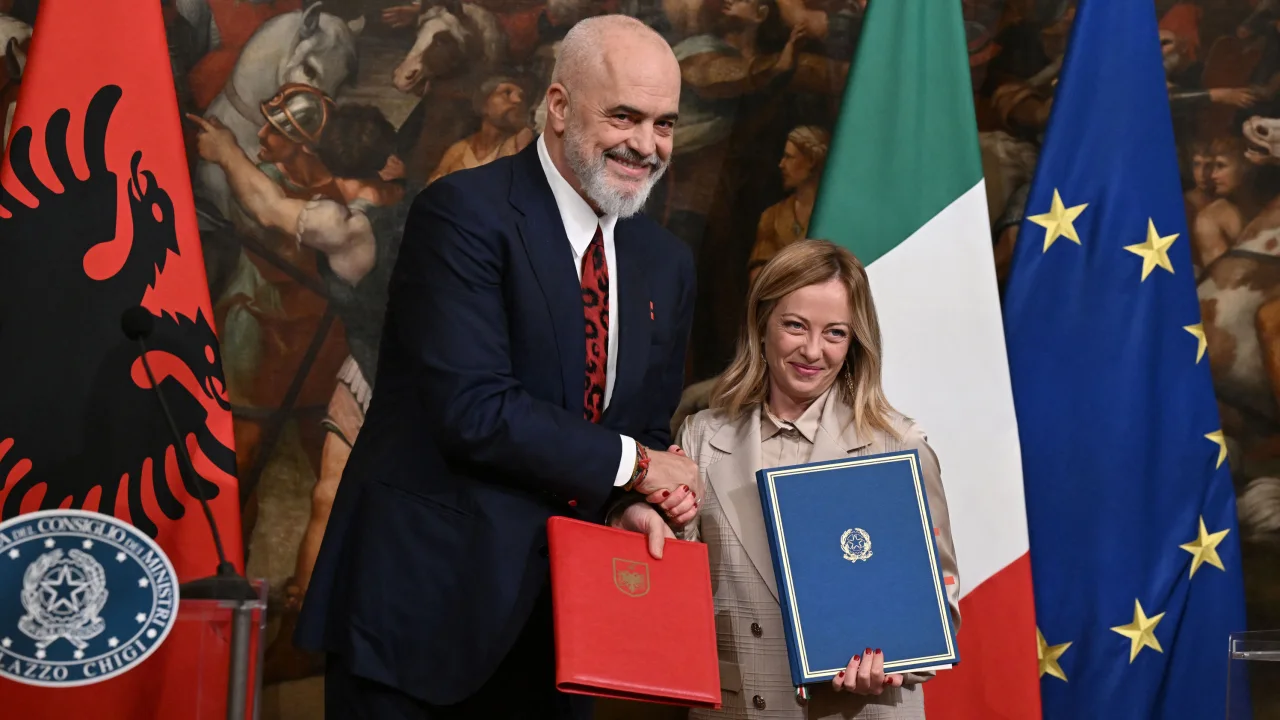
So far this year, 233,500 refugees and migrants have arrived in Europe’s Mediterranean region, compared to 159,410 during the whole of 2022. Several EU states–including the EU’s three largest economies, Germany, France, and Italy–have focused on intensifying detention measures as a tool for responding to these growing challenges, raising concerns about the region’s faltering commitment to basic human rights norms.
Italy & Albania: Extraterritorial Detention Inside Europe
On 6 November, Italy and Albania signed an agreement to establish two “processing” centres in Albania to accommodate people interdicted at sea by Italy, which may lead to a new extraterritorial detention system inside Europe. According to Italian Prime Minister Giorgia Meloni, the two centres–due to open next spring in the ports of Shëngjin and Gjadër–will hold up to 3,000 people, and will aim to “process” up to 36,000 people each year.
Unlike recent proposals by the UK and Denmark to externalise migration management to Rwanda wherein detainees will fall under Rwandan jurisdiction, Italy has claimed that those detained in the facilities will remain under Italian jurisdiction. However, observers such as Amnesty International have questioned the realities of this, arguing that the deal could result in thousands of refugees and migrants facing lengthy detention and other violations–as Albania, a non-EU state, does not apply EU asylum law.
Italy’s EU partners are also showing signs of alarm over this agreement. According to the Guardian, Brussels received “practically zero notice” of the deal before it was signed. One EU official noted: “We have asked for detailed information. … We need to see the details of this arrangement so we can speak about this assessments [and] implications.”
The deal to detain migrants outside Italy comes as recent court decisions have faulted the country for its arbitrary use of detention measures. According to PICUM, courts in Catania, Italy, have recently ruled “against the immigration detention of asylum-seekers coming from ‘safe third countries’ and subjected to an accelerated asylum procedure, as foreseen in a governmental decree. The judges found that the decree contradicts EU rules and Italy’s own Constitution, as it automatically imposes immigration detention to certain people, without any individual assessment. The Italian government appealed the rulings before the Court of Cassation.”
France: New Detention Centres, Stricter Immigration Laws
This week, French senators have been debating a bill intended to tighten the country’s Immigration Law, but which rights groups argue threatens migrants’ rights. Amongst its 27 provisions, the bill would ease authorities’ ability to deport individuals who present a “serious threat to public order”–including by removing protections against individuals such as those who are parents to a French child, and those who arrived in France before they turned 13. According to UNICEF, this would conflict with the Convention on the Rights of the Child, to which France is party.
The bill also has important implications for detention practices. While it seeks to ban the placement of children under the age of 16 in immigration detention, rights advocates argue that this does not go far enough. Indeed, children over the age of 16 would remain vulnerable to detention, as would all children in overseas territories like Mayotte and those apprehended at borders and airports. Additional concerns include the reduction of time limits for appeals in various asylum and immigration processes, the elimination of state medical aid for undocumented migrants, and restricting family reunification.
The new legal proposals come on the heels of the announcement from French Interior Minister Gerald Darmanin in mid-October that the country plans to double the size of its immigration detention system by opening up to 11 new centres over the next four years and increasing detention spaces from 1,500 to 3,000.
Germany: Stricter Measures to Curb Arrivals
Draft legislation tabled by government of German Chancellor Olaf Scholz in October aimed at easing the deportation of failed asylum seekers includes increasing the length of pre-departure detention from 10 to 28 days, which according to reports is aimed at “facilitating the deportation of people who are members of a criminal organisation. It also would authorise residential searches for documentation that enables officials to firmly establish a person’s identity, as well as remove authorities’ obligation to give advance notice of deportations in some cases.”
Chancellor Scholz and the country’s 16 state governors have also recently negotiated a series of stricter measures to curb the number of refugee and migrant arrivals. In the new deal, announced in early November, authorities agreed to cut the benefits available to migrants, and to process asylum applications faster in order to speed up deportations.
During the negotiations, it was also agreed that Germany would investigate the feasibility of assessing asylum claims outside of the EU–mirroring Italian, British, and Danish efforts to externalise migration management. Pro Asyl, a German NGO that supports asylum seekers in the country, said it was “appalled” by the news and noted that: “the UK-Rwanda deal, the EU-Turkey deal and the Australia model clearly show that such externalization models cannot be implemented as intended and that massive human rights violations and violations of the rule of law are inevitable.”


